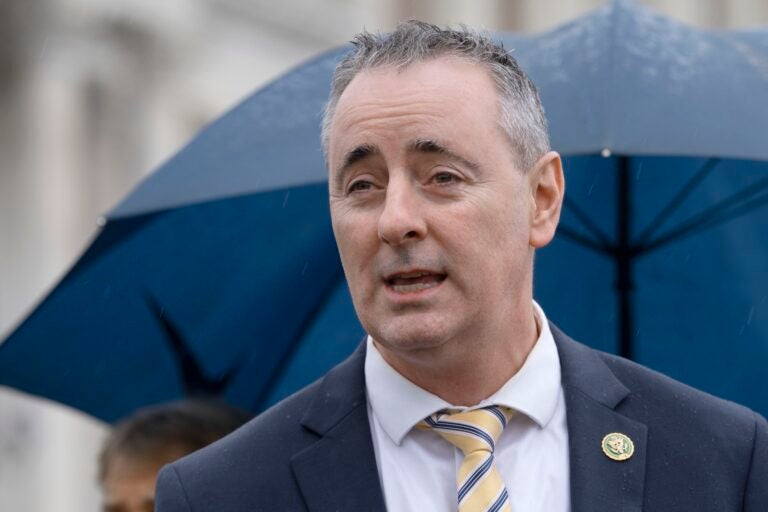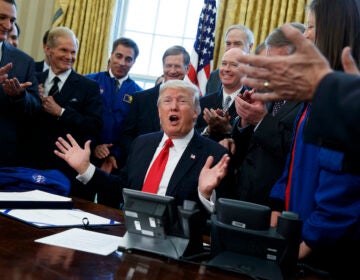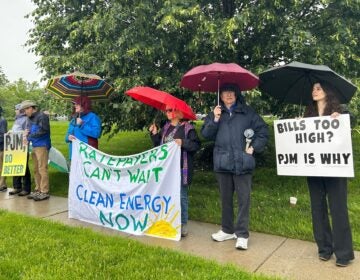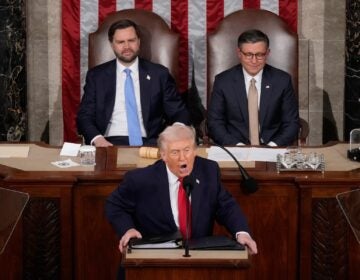Pa. solar installers were counting on U.S. Rep. Fitzpatrick to keep tax credits. Some feel ‘abandoned’ by GOP rollbacks
The House budget bill Rep. Brian Fitzpatrick voted for would be a “disaster” for business, solar installers say.
Listen 2:23
FIILE - Rep. Brian Fitzpatrick, R-Pa., speaks at a news conference, Jan. 31, 2023, on Capitol Hill in Washington. (AP Photo/Jacquelyn Martin, File)
This story is part of the WHYY News Climate Desk, bringing you news and solutions for our changing region.
From the Poconos to the Jersey Shore to the mouth of the Delaware Bay, what do you want to know about climate change? What would you like us to cover? Get in touch.
Solar energy companies across the region are reeling at the prospect of rollbacks to the solar energy tax credits included in the budget bill that passed the U.S. House in May.
“It’s terrible,” said Micah Gold-Markel, founder of Solar States, a solar energy installer that employs about 60 people in the region. “Trump really framed this as the ‘green waste of money.’ Well, if you think that people’s jobs and their livelihoods are a waste of money, then you’re missing the story of America.”
Gold-Markel said if President Donald Trump’s stated goal is to create “American energy dominance,” then solar should be a big part of that.
“Solar creates jobs. It doesn’t destroy them,” Gold-Markel said.
The 30% tax credits have helped make solar affordable for many residents and businesses, especially since the up-front costs to install panels are high and can take time to recoup from resulting lower electricity bills. But the House budget passed on May 21 would eliminate the tax credit 60 days after the budget is approved.
“We’re telling clients, let’s get construction started so that we still qualify in the 60-day window for construction starting,” said Gold-Markel. “But residentially, it’s a disaster, and I could see us having to lay off a quarter of the company.”
Gold-Markel said the tax credits helped him build his business, but if the provision gets approved by the U.S. Senate, it’s not clear whether it will survive. The Inflation Reduction Act, which extended the tax credits, also helped nonprofits, including churches and schools, take advantage of solar credits through “direct pay.”
“Direct pay allows for nonprofits, which don’t have tax liability, to get cash instead of the tax benefit,” Gold-Markel said. “That changed everything.”
Thousands of Pa. jobs at stake if solar tax credits disappear
The GOP’s House budget bill would effectively end a surge in Biden-era solar energy projects that proponents say created jobs, boosted manufacturing and tackled climate change. Without the credits, the industry says utility bills will rise, along with job cuts. The Solar Energy Industries Association predicts the loss of more than 4,300 jobs, and the closure of up to 20 current or pending factories in Pennsylvania, if the current version of the rollback makes it into the final budget.
The bill squeaked through by one vote along party lines, but solar installers, manufacturers and building trades unions in the region had hoped that support from Republican Congressman Brian Fitzpatrick would lessen the pain. Fitzpatrick, a moderate whose district includes Bucks and parts of Montgomery counties, voted for the budget bill. More importantly, he sits on the influential House Ways and Means Committee, which drafted the language of the bill, and proponents of the tax credits say he had reassured them he would defend the measures.
“We intentionally met with [Fitzpatrick’s] office,” said Gold-Markel. “We brought workers in his district to show him that there are jobs at stake in his district. We showed him projects. Rep. Fitzpatrick completely abandoned the renewable energy workers in his district.”
Multiple efforts to reach Fitzpatrick for this story went unanswered.
The original language passed by the committee, which had phased out the credits over a number of years, was replaced by language that would eliminate the credits within 60 days, a move that took many by surprise.
“None of [the Republican lawmakers] want to cross President Trump in a GOP that at this point is more of a personality cult than a real political party,” said Jason Walsh, executive director of the BlueGreen Alliance, a coalition of labor and environmental groups. “But we had hoped that members like Mr. Fitzpatrick would use their negotiating leverage and positions on key committees to protect these investments during the process of writing the bill.”
Walsh was particularly irked by the absence of Fitzpatrick during a failed committee vote to keep the clean energy tax credits.
“It’s not clear why he didn’t vote on that amendment, and it’s honestly puzzling,” said Walsh. “I think the question constituents should be asking is why their representative in the U.S. House says all the right things about these job-creating, pollution-reducing investments, but when the rubber hits the road, he’s missing in action on the committee that writes the bill, and he ultimately votes for a bill that screws over workers in his district, and trashes our air and water and climate.”
The Solar Energy Industries Association estimates the solar and manufacturing tax credits, which are part of the Inflation Reduction Act, helped spur about $5.4 billion in private investments in Pennsylvania alone.
“If Congress does not change course, this legislation will upend an economic boom in this country that has delivered an historic American manufacturing renaissance, lower electric bills, hundreds of thousands of good-paying jobs, and tens of billions of dollars of investments primarily to states that voted for President Trump,” said Abigail Ross Hopper, CEO of SEIA, in a statement.
Impact of solar tax credits on manufacturing
Another goal of the Inflation Reduction Act was to use the tax credits to boost investment and bring solar manufacturing back to the U.S. But Kyle Wallace, vice president of public policy at PosiGen, a residential solar installer based in New Orleans with operations in Pennsylvania, said the demise of the solar tax credits would upend growth in manufacturing, especially in red states like Texas, Ohio and Florida, where PosiGen sources much of its supplies.
“We’ve been able to shift our supply chains to where now, all the major equipment is manufactured in the United States, which is amazing,” said Wallace. “And it’s something we’re really proud of. But if those manufacturing facilities don’t have the demand from companies like PosiGen, it’s really questionable whether or not they will stay open, and whether we’ll just kind of lose those manufacturing jobs back overseas.”
PosiGen works with Solarize Philly, which encourages solar panel installations on homes of low-income residents. Since the customers’ income isn’t high enough to take advantage of the tax credits, the company itself takes the credit, and thereby passes on the savings. But without the tax credits, it’s unlikely that business model could work for companies like PosiGen. Wallace said it’s too early to speculate the impact on employees.
Wallace said he too met with Fitzpatrick’s staff and came away hopeful, but is now disappointed the end result is worse than what the committee itself had drafted.
Jack Pratt, associate vice president of the Environmental Defense Fund Action, said in the end, House Speaker Mike Johnson made the decision to side with the hard-liners, which include central Pennsylvania Rep. Scott Perry.
“[Johnson] could have said, ‘Let me try to deliver for the moderates in my caucus, who have said they want to preserve these incentives,’ or, ‘Let me try and make sure that I can hold on to the far right, the Freedom Caucus folks,’” said Pratt. “And, you know, in Pennsylvania, you have both, right? You got the moderate side, you’ve got the Brian Fitzpatricks of the world, and then you’ve also got the Scott Perrys, the Freedom Caucus folks who say that they want to see all these incentives end.”
Pratt, however, doesn’t point the finger at Fitzpatrick.
“What ended up passing through the House was, from our perspective, awful,” said Pratt. “It is essentially, kind of a de facto cut of all the clean energy tax incentives. But if there were 218 Brian Fitzpatricks in the Republican Party, then we’d be a lot better off.”
He also said the game is not over.
“We’re not giving up on this, and we really do want to see the Senate make improvements,” Pratt said.
Gold-Markel said he’s also not giving up, especially since so much is at stake.
“I’m hoping that [Sen. John] Fetterman stands up and says we have a lot of renewable energy jobs in Pennsylvania,” said Gold-Markel. “I’m hoping that [Sen. Dave] McCormick stands up. I’m trying to get a meeting with McCormick as soon as possible.”
He said he wants them to talk straight about what they can and cannot do to hold the line for the solar tax credits.
“I’m encouraged, but skeptical. Are we going to get the Fitzpatrick treatment again? I don’t know,” said Gold-Markel.

Get daily updates from WHYY News!
WHYY is your source for fact-based, in-depth journalism and information. As a nonprofit organization, we rely on financial support from readers like you. Please give today.







